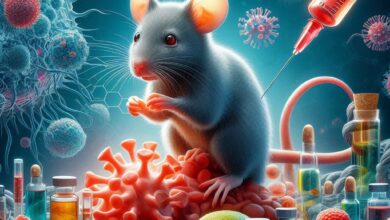Noida, Uttar Pradesh – Recent research led by a team from the Department of Pharmacology, Dr. D. P. Rastogi, Central Council for Research in Homoeopathy, has provided promising insights into the safety of Syzygium jambolanum mother tincture, particularly in its application for gestational diabetes management. The study, published by Mahima Sharma and her colleagues, evaluated the effects of this homeopathic remedy on the development of zebrafish embryos, offering hopeful prospects for its use during pregnancy.
Gestational diabetes mellitus (GDM) affects approximately 7% of pregnancies globally, posing significant risks to both maternal and fetal health. Syzygium jambolanum, a natural remedy traditionally used for diabetes management, has been under scrutiny to ensure its safety for pregnant women and their developing embryos.
The research team, which included scientists from Dr. Anjali Chatterjee Regional Research Institute for Homoeopathy and the Central Forensic Science Laboratory, Ministry of Home Affairs, designed the study to assess potential embryotoxic effects of Syzygium jambolanum tincture. Zebrafish embryos were exposed to varying concentrations (1%, 5%, and 10%) of the tincture, with observations on mortality, hatching rates, physical development markers, and locomotor activity recorded over specific periods.
Key Findings:
- Low Concentration Safety: The study found that at 1% and 5% concentrations, Syzygium jambolanum did not adversely affect zebrafish embryo development. These concentrations are deemed safe, showing no significant increase in mortality or developmental abnormalities compared to controls.
- Alcohol-Induced Toxicity at High Concentrations: At the 10% concentration level, increased embryo mortality and developmental issues were observed, which the researchers attributed to the high ethanol content rather than the active components of Syzygium jambolanum.
- Cardiac Protection: Interestingly, the study also noted that while alcohol exposure alone negatively impacted heart rate in embryos, the addition of Syzygium jambolanum appeared to mitigate these effects, suggesting a potential protective role for the remedy in cardiac function.
Lead researcher Mahima Sharma emphasized the importance of these findings, stating, “Our results suggest that Syzygium jambolanum mother tincture is safe at lower concentrations and might even offer protective benefits for cardiac health in embryos. However, the adverse effects observed at higher concentrations highlight the need to consider ethanol content in the formulation.”
The researchers advocate for further developmental toxicity studies on animals to confirm these findings, followed by clinical trials to ensure the safety and efficacy of Syzygium jambolanum for managing gestational diabetes in pregnant women.
As the medical community continues to seek safer and more effective treatments for gestational diabetes, this study provides a foundational step towards understanding the potential benefits and limitations of Syzygium jambolanum, bringing hope to expectant mothers managing this challenging condition.




